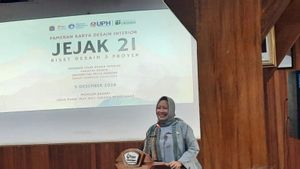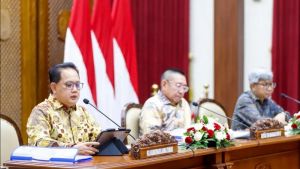JAKARTA - Head of Communication and Public Services Bureau of the Ministry of Health (Kemenkes) dr. Siti Nadia Tarmizi M.Epid said that implementing excise duty on packaged sweetened drinks (MBDK) is one of the efforts that can be made to control the risk of obesity to diabetes.
"We (Ministry of Health) also propose, in strengthening regulations, the imposition of excise on packaged sweetened drinks. So as one way to control non-communicable diseases in the fiscal field, we propose to the Minister of Finance that excise be applied," Nadia said as reported by ANTARA, Wednesday, March 8.
Even though the price of packaged sweet drinks could be more expensive later, Nadia said it was better than Indonesia having to have a heavier burden related to the risk of non-communicable diseases in the future.
However, added Nadia, the plan to implement the excise duty may not be carried out this year. Even so, she ensured that the policy plan was still in process and needed further discussion at the Ministry of Finance, especially to involve discussions with experts, industry, and the public.
"The excise tax is included as a regulation for the 2023 state budget, yes, I think it's impossible for us to catch up with it. Maybe later in 2024. But we will still oversee it," said Nadia.
"But actually the Ministry of Finance has agreed, yes, for sweetened drinks, it will be one that we add to the excise," she added.
Just like when tobacco excise was first introduced, according to Nadia, the tariff for sweetened drink excise will be implemented gradually and indirectly at a fairly high figure.
"We don't give a figure, yes, we leave it to the Ministry of Finance for what figure will be agreed upon at the level. So the Ministry of Finance will carry out the initial initiation of what excise rate will be applied," she said.
VOIR éGALEMENT:
Consumption of sweet drinks with high sugar content can increase the risk of obesity and metabolic diseases such as diabetes. Obesity itself, explained Nadia, is a disease as well as a risk factor.
"Obesity is a risk to become a sufferer of diabetes mellitus will also increase almost four times," she said.
According to the results of the 2022 Indonesian Nutritional Status Survey (SSGI), the prevalence of overweight or obesity is 3.5 percent, or only decreased by 0.3 percent from 3.8 percent in 2021. Overweight is one of the four nutritional problems in toddlers that the government is highlighting.
Nadia said that currently, the government is focusing more on the prevention of stunting considering that the prevalence is still high, namely 21.6 percent, according to SSGI 2022. Even so, the condition of the problem of being overweight is still a concern for the government.
"That's why the government really wants to prevent it from focusing more on this stunting effort. But that doesn't mean we don't take care of it," she said.
Similar to the case with stunting, Nadia said that preventing obesity in toddlers can actually be done through monitoring the growth and development of children such as by means of anthropometry or monitoring with obesity charts in posyandu services.
She also warned not to let children grow up with obesity, even left to adulthood. Plus, parents should also be able to apply good parenting by staying away from children from drinks and foods with high sugar content.
"Mothers also tend to want to buy (sweetened drinks), even though the sugar content is very high. And if children have been drinking with very high sugar levels since childhood, it is very difficult (a habit until adulthood)," said Nadia.
The English, Chinese, Japanese, Arabic, and French versions are automatically generated by the AI. So there may still be inaccuracies in translating, please always see Indonesian as our main language. (system supported by DigitalSiber.id)













